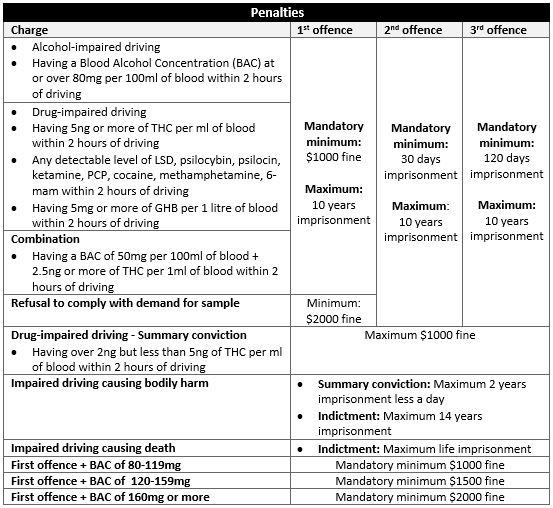Impaired driving is the term used in Canada to describe the criminal offence of operating,having care or the control of a motor vehicle while the person’s ability to operate the motor vehicle is impaired by alcohol or a drug. Impaired driving is punishable under multiple offences in the Criminal Code, with greater penalties depending on the harm caused by the impaired driving. It can also result in various types of driver’s licence suspensions.
There is a related, parallel offence of driving with a blood alcohol level which exceeds eighty milligrams of alcohol in one hundred millilitres of blood (.08). The penalties are identical for impaired driving and driving with a BAC greater than .08.
The Criminal Code gives the police a number of powers to assist in the enforcement of the offences, and there are a number of presumptions that assist in the prosecution of the offences.
How drugs and alcohol affect your driving
Many drugs, even those prescribed by a doctor or purchased over-the-counter, can impair your ability to drive safely. For example, smoking, vaping or eating cannabis can increase your risk of being involved in a motor vehicle collision. If you are unsure of whether it is safe for you to drive while taking your medication, talk to your doctor or pharmacist.
The Canadian Society of Forensic Science recently released a report stating that impairment from cannabis begins almost immediately and can last up to 6 hours or more, depending on factors such as THC levels and how it is consumed. Frequent high-dose THC users may experience even longer periods of impairment. However, since the effects of cannabis vary, there is no way to know exactly how long to wait before it is safe for you to drive. The best way to avoid impaired driving is to not take a chance. If you’re using cannabis, plan another way home.

Alcohol — even one drink — can reduce your ability to react to things that happen suddenly. The effects of alcohol also include blurred or double vision, impaired attention and slowed reflexes. Alcohol-impaired driving is one of the leading causes of death on Ontario’s roads.
What counts as impaired driving
Impaired driving means operating a vehicle (including cars, trucks, boats, snowmobiles and off-road vehicles) while your ability to do so has been compromised to any degree by consuming alcohol, drugs or a combination of the two.
Fully Licensed Drivers
Throughout Canada, the maximum legal blood alcohol concentration (BAC) for fully licensed drivers is to be under 80 milligrams of alcohol in 100 millilitres of blood, or 0.08. Driving with a BAC of 0.08 or over is a criminal offence and the penalties are severe.
In Ontario, you will also face serious consequences if your BAC is between 0.05 and 0.08. This is commonly referred to as the “warn range.”
If police determine that you are driving while impaired by any drug, including illegal drugs, cannabis, prescription and over-the-counter medications, you will face severe consequences and criminal charges.
Impaired driving is the leading criminal cause of death and injury in Canada. In 2017, there were more than 69,000 impaired driving incidents reported by the police, including almost 3,500 drug-impaired driving incidents.

Please visit Canada’s impaired driving webpage for statistics, research, and more information on the dangers of driving while impaired.
It is important to note that provinces and territories have additional laws or regulations that may apply. Make sure to check the laws in your area.
Penalties
Impaired driving is a serious crime that poses a significant threat to public safety. Having the prohibited level of alcohol, THC, or other impairing drugs in your blood within two hours of driving is an offence.
Penalties for committing this conduct can vary, depending on the alcohol or drug concentration, whether it is your first or a repeated offence, and whether you have caused bodily harm or death to another person.

Other investigative techniques
Police can also demand a driver submit to a Standard Field Sobriety Test (SFST) or a Drug Recognition Expert Evaluation (DRE).